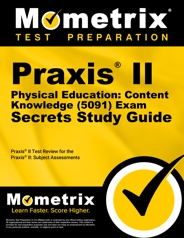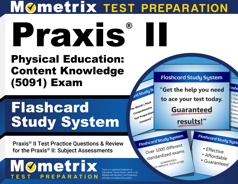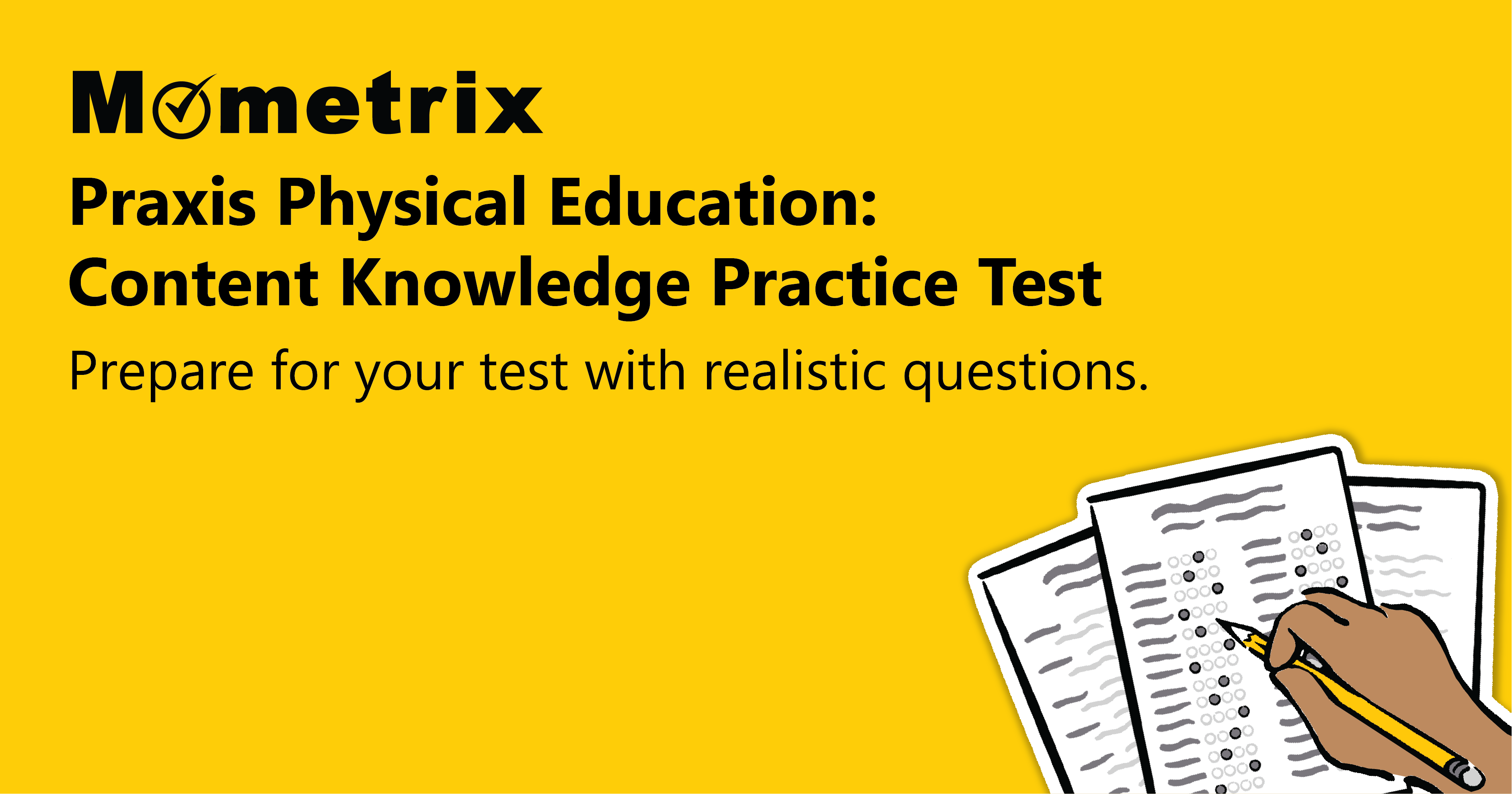The Praxis® Physical Education: Content Knowledge exam is a test used to evaluate the knowledge and skills of prospective physical education teachers of elementary school through high school students.
Click “Start Test” above to take a free Praxis Physical Education practice test!
Exam Outline
The Praxis Physical Education Content Knowledge exam contains 120 selected-response questions and has a time limit of 2 hours.
The exam is split into four content categories, which are designed to cover the various competencies and points of knowledge that a physical education teacher should possess.
I. Content Knowledge and Student Growth and Development (36 questions)
The questions in this category cover the following topics:
Core Concepts
- Concepts of movement
- Anatomy and physiology
- Terminology related to motor skills and movement activities
- Concepts, principles, and applications of the basic sciences
- Exercise physiology
- Biomechanics and kinesiology principles pertaining to motor skills
- Skills, strategies, concepts, and rules pertaining to movement activities and games
- Effects of substance abuse on student performance and behavior
- Liability and legal considerations pertaining to program selection, class organization, use of equipment, and supervision
- Physical education trends, developments, and issues
Student Growth and Development
- Motor development perception
- Monitoring of individual and group performance
- Meeting students’ needs with professional support services and resources
- Developmental readiness to learn and refine movement patterns and motor skills
- Learning and practice opportunities based on motor development stages and growth
- Instruction related to cultures, ethnicities, home environments, personal and family values, and community values of students
II. Management, Motivation, and Communication (30 questions)
The questions in this category cover the following topics:
Management and Motivation
- Organization and management of resources in order to provide equitable learning experiences
- Effective behavior management plans
- Psychological and social factors that affect various aspects of the physical education setting
- Promotion of positive relationships
- Classroom management practices that create effective learning experiences
- Encouragement of responsible behaviors among students
- Establishing a productive learning environment
Student Growth and Development
- Communicating respectfully and considerately
- Specific instruction feedback in motivation, acquisition, and student learning
- Verbal and nonverbal communication skills
- Communicating classroom management and instruction information
III. Planning, Instruction, and Student Assessment (30 questions)
The questions in this category cover the following topics:
Planning and Instruction
- Designing learning experiences using teaching resources and curriculum materials
- Providing feedback to enhance the development of skills
- Developing lesson plans based on instructional goals and student needs
- Using safety and injury prevention guidelines to plan activities
- Teaching skillful movement, fitness, and physical activity
- Activities that improve fitness
- Linking physical activities to learning experiences
- Current trends, laws, and issues that affect the choice of appropriate activities
- Improvement of learning in physical education activities via the sequencing of activities
- Development and implementation of goals and objectives
Student Assessment
- Appropriate assessment of individuals with disabilities
- Understanding fitness assessments
- Assessment of student skills performance and fitness
- Involvement of students in self-assessment
- Interpreting assessment results
- Gathering data pertaining to student learning
- Referral procedures
IV. Collaboration, Reflection, and Technology (24 questions)
The questions in this category cover the following topics:
Collaboration
- Establishing productive relationships with parents/guardians, organizations, school colleagues, and community members
- Current issues in education across subject matter
- Promoting physical activity opportunities
- Integrating skills and knowledge from various subject areas into physical education
Reflection
- Development and growth as a reflective professional
- Facilitating change in teacher performance and student learning via the reflective cycle
Student Assessment
- Using technology to enhance professional development
- Using technology to communicate and network
- Using technology to assess, instruct, and present information
- Designing and implementing student learning activities that integrate technology
Check Out Mometrix's Praxis Study Guide
Get practice questions, video tutorials, and detailed study lessons
Get Your Study Guide
Registration
To register for the Praxis Physical Education exam, you will need to create an online account with ETS. Through this account, you can submit an application to take the exam.
During registration, you will be asked to select the test-taking format (remote or at a testing center), test location (if you are taking the test at a testing center), and test date. You will also need to pay the $130 exam fee.
Test Day
In-person Testing
On exam day, you should arrive at the testing center 30 minutes before the scheduled testing appointment. When you arrive, you will be asked to provide your admission ticket (a printed copy, not a copy on your phone) and two forms of valid identification.
After the check-in process, you will be asked to store all personal items, such as your cell phone, notebooks, bags, and food items, in a secure locker before entering the testing area.
Once the check-in process is complete and you are fully approved for testing, you will be led to the testing station and receive a piece of scratch paper for notes.
Remote Testing
To take the exam remotely, you must use a laptop or desktop computer that does not have touchscreen capabilities (tablets and smartphones are not allowed). You will also need a functioning webcam, speakers, and a microphone.
Before exam day, you will need to download and install the ETS Secure Test Browser on your computer. This is the only acceptable browser for taking the exam.
When you check in to take the exam, the remote proctor will ask you to show proof of identification and to move your webcam around the room so that your testing area can be observed. Once the proctor has approved your testing area, they will walk you through the testing process and begin your exam.
How the Exam is Scored
Your Praxis Physical Education exam score is based on the number of questions you answer correctly (your raw score). Your raw score is converted to a scaled score. The scaled score you need to obtain differs slightly depending on which state you take the exam in.
You should receive an official score report about 5 weeks after testing.
Check Out Mometrix's Praxis Flashcards
Get complex subjects broken down into easily understandable concepts
Get Your Flashcards
FAQs
Q
How many questions are on the Praxis Physical Education exam?
A
There are 120 selected-response questions on the exam.
Q
How long is the Praxis Physical Education exam?
A
The time limit for the exam is 2 hours.
Q
What is the passing score for the Praxis Physical Education exam?
A
The passing score will differ depending on which state you take the exam in.
Q
How much does the Praxis Physical Education exam cost?
A
The examination fee is $130.
Praxis is a registered trademark of Educational Testing Service, which is not affiliated with Mometrix Test Preparation and does not endorse this page.



